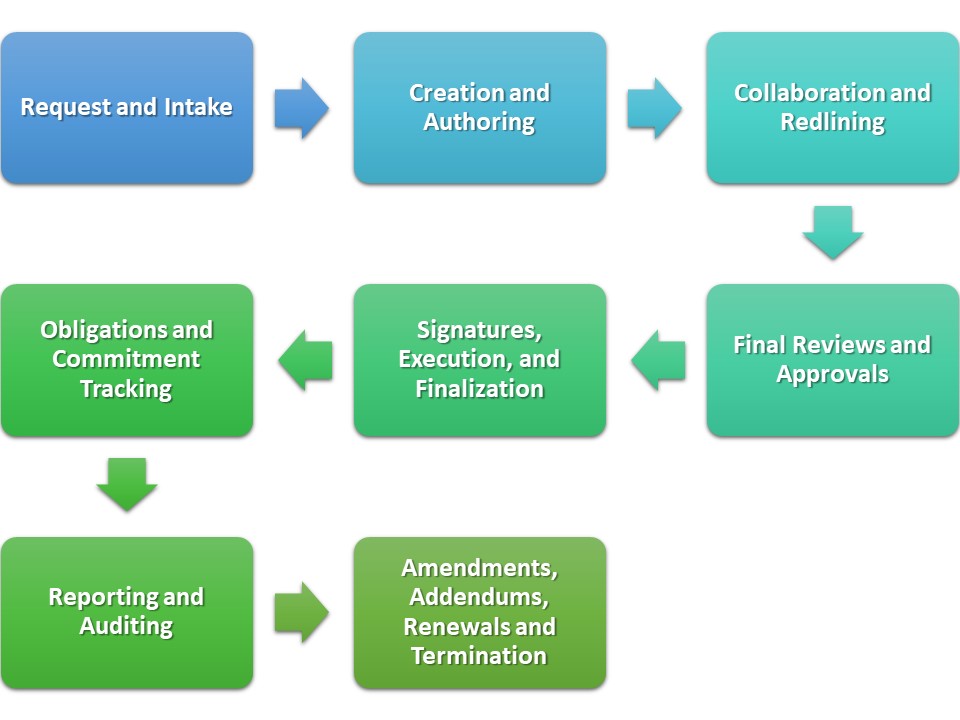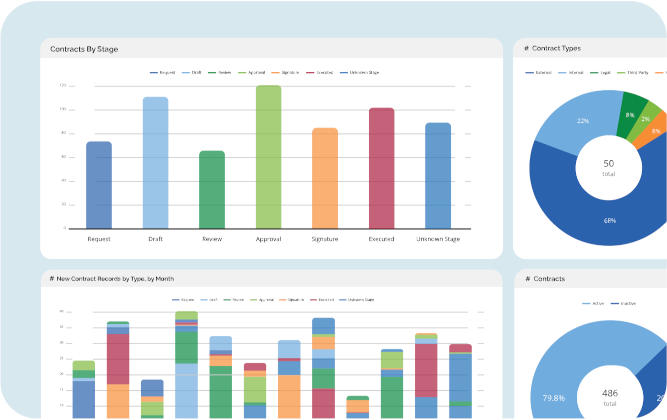Choosing the Right Contract Management Softwares for Your Business
Contracts sit at the center of every business relationship. They define commitments, outline obligations, and protect organizations from risk. Yet many companies still rely on manual processes, spreadsheets, or email-driven reviews. These outdated methods waste valuable time, introduce costly errors, and expose businesses to compliance failures.
The market is full of contract management softwares, each promising efficiency and automation. Sorting through the options can feel overwhelming, especially when features and pricing models differ widely. The key is not simply choosing the solution with the longest feature list, but finding a platform that aligns with your business priorities. This guide explores essential features, pricing considerations, and best practices to help you evaluate contract management softwares with confidence.
Quick Takeaways
- Selecting contract management softwares starts with understanding your unique business needs.
- AI-powered data extraction creates a trusted data foundation for reporting and compliance.
- Automated workflows accelerate cycle times and enforce consistency.
- Contract Operations as a Service (COaaS) ensures long-term adoption and optimization.
- Built-in compliance tools and risk visibility are essential in regulated industries.
Get practical strategies in The Complete Business Guide to the 8 Phases of CLM to streamline processes and reduce risk.
Step One: Understand Your Business Needs
Every organization has different goals for contract management. Some want faster cycle times to accelerate revenue. Others need airtight compliance to pass audits or satisfy regulators. Many seek improved visibility into obligations and renewals to avoid missed opportunities or penalties.

When evaluating contract management software solutions, the first step is to define your top priorities. Do you need scalability to handle thousands of contracts across regions? Or do you need stronger controls for a smaller portfolio in a highly regulated industry? Select a solution that aligns directly with your objectives and delivers measurable results.
AI-Powered Data Extraction: Accuracy and Efficiency at Scale
Manual contract intake is one of the biggest sources of inefficiency. Relying on people to rekey terms, dates, and obligations leads to delays and errors.
AI-powered data extraction eliminates manual entry by scanning contracts, identifying key details, and capturing metadata with precision. This includes effective dates, renewal terms, obligations, and high-risk clauses.
Benefits include:
- Faster onboarding of third-party contracts.
- Greater confidence in the accuracy of contract records.
- A reliable data foundation that fuels reporting, compliance tracking, and analytics.
With AI-driven extraction, businesses can make smarter decisions based on accurate, accessible information rather than incomplete spreadsheets.
Automated Workflows: Accelerate Approvals and Ensure Compliance
Contract workflows guide documents through creation, review, approval, and signature. In manual environments, these steps often stall in inboxes or require repeated follow-up.
Automated workflows ensure contracts move forward consistently and without unnecessary delays. Rules can be configured to automatically flag nonstandard terms, route contracts to the right approvers, and trigger alerts when deadlines approach.
Example: A buyer submits a supplier agreement with pricing outside standard ranges. The workflow automatically routes the contract to legal for review, reducing the chance of risky terms slipping through.
Buyer tip: Look for contract management softwares with customizable workflows. Every organization has unique processes, and one-size-fits-all solutions rarely meet compliance requirements.
Contract Operations as a Service: More Than Software
Many organizations invest in contract management software but fail to achieve long-term adoption. Technology alone cannot guarantee success.
Contract Operations as a Service (COaaS) provides a flexible managed-service model that combines software with ongoing expertise. It supports organizations that need extra help configuring workflows, cleaning up data, or training staff.
Key advantages of COaaS include:
- Available as-needed or continuously, depending on business size and maturity.
- Provides continuity even during internal staffing changes.
- Ensures long-term optimization as regulations, business models, and priorities evolve.
When evaluating contract management softwares, ask vendors how they support customers after go-live. COaaS ensures the investment continues delivering value well beyond implementation.
Built for Highly Regulated Industries: Compliance and Risk Visibility
Industries such as healthcare, financial services, life sciences, and energy face heightened compliance requirements that make contract management more complex. Contract management software solutions designed for these environments must include built-in controls that not only ensure audit readiness but also reduce regulatory risk.
Examples of compliance frameworks and requirements include:
- Healthcare (HIPAA): Contracts must safeguard protected health information (PHI) and comply with data privacy rules.
- Financial Services (SOX, Dodd-Frank): Agreements must meet strict financial reporting and accountability standards.
- Life Sciences (FDA 21 CFR Part 11): Contracts must follow rules for electronic records and digital signatures in regulated environments.
- Global Data Privacy (GDPR, CCPA/CPRA): Contracts must account for evolving obligations around data protection, consent, and cross-border data flows.
Features to look for:
- Comprehensive audit trails that document every change and approval for regulatory reviews.
- Granular user permissions that protect sensitive information and control access to PHI or financial data.
- Automated policy enforcement that ensures contracts consistently meet compliance standards.
- Reporting tools that satisfy auditors, regulators, and internal governance requirements.
Risk visibility is equally important. Software should flag contracts with nonstandard clauses or terms that increase exposure.
Pricing and Value Considerations
Price is often a deciding factor, but evaluating CLM software requires a broader view than license fees alone.
Common pricing models include per-user subscriptions, per-contract fees, and enterprise licenses. Each model has advantages depending on business size and contract volume. However, hidden costs (such as underutilized features, training, or the need for additional staff) can erode ROI.
COaaS provides a value advantage:
- Reduces the need to hire specialized contract management staff.
- Ensures systems stay optimized, avoiding costly inefficiencies.
- Offers flexibility to scale support up or down as business needs change.
By evaluating total cost of ownership and factoring in managed services, organizations can make more accurate ROI projections.
Real-World Benefits to Expect

When implemented effectively, contract management software delivers measurable improvements across the organization:
- Faster contract cycle times that accelerate revenue and reduce bottlenecks.
- Reduced risk through consistent compliance and audit readiness.
- Lower operational costs by replacing manual processes with automation.
- Greater visibility into renewals and obligations, preventing missed deadlines.
Companies that adopt AI-powered data extraction, automated workflows, and COaaS experience improvements not only in efficiency but also in trust and decision-making, demonstrating the power of modern digital contract management tools.
FAQ
Q: What is contract management software?
A: Contract management software is a digital platform that helps organizations create, store, track, and manage contracts throughout their lifecycle. It replaces manual methods like spreadsheets or email with centralized, automated workflows that improve visibility, reduce risk, and ensure compliance.
Q: Which features matter most in CLM software?
A: The most important features in contract lifecycle management (CLM) software include AI-powered data extraction for accurate reporting, automated workflows for faster approvals, built-in compliance and audit trails, configurable dashboards, and integrations with tools like CRM or ERP systems. These capabilities accelerate cycle times, reduce errors, and provide the visibility needed to manage obligations and renewals effectively.
Q: Why choose COaaS with contract management software?
A: Contract Operations as a Service (COaaS) ensures that organizations achieve long-term success with their contract management investment. Beyond the software itself, COaaS provides ongoing configuration support, data management, training, and optimization. This continuous oversight helps maintain adoption, reduces the risk of compliance gaps, and ensures the platform evolves as business needs and regulations change.
Streamline Contract Management with Contract Logix
Contract management softwares vary widely, but the right solution will align with your priorities, scale to meet your needs, and deliver measurable ROI. By focusing on AI-powered data extraction, automated workflows, COaaS, and built-in compliance features, organizations can transform contracts from a source of risk into a source of opportunity.
Contract management success demands trusted tools and ongoing support. With Contract Logix, businesses gain AI-powered data extraction, automated workflows, flexible COaaS services, and proven expertise in highly regulated industries.
Ready to choose the right contract management software for your business? Schedule a demo today to start building a smarter, more efficient contract management process.
Navigate CLM Success With Contract Logix
Download our Data Extraction Product Brief to learn how you can begin to navigate CLM success by automating the hard work using artificial intelligence with one of the best Contract Management Software’s on the market today


